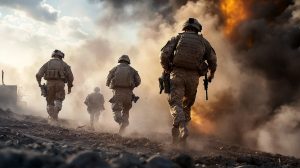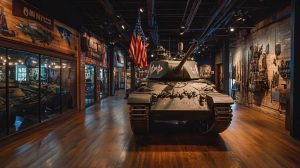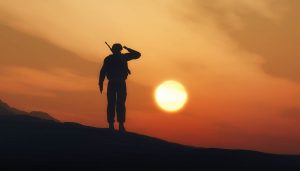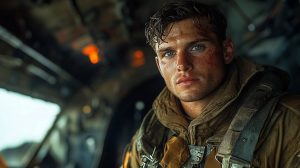Unsung Heroes of Western North Carolina: Stories of Bravery in World War II
4 min read
Throughout World War II, countless men and women from Western North Carolina answered the call to serve, displaying extraordinary courage in the face of adversity. While history books often highlight the generals and famous battles, many local heroes remain in the shadows. These unsung individuals—soldiers, medics, pilots, and resistance fighters—played crucial roles that deserve recognition. Their bravery, sacrifice, and resilience helped shape the outcome of the war and left an enduring legacy in their communities.
This article brings to light the extraordinary stories of several individuals from Western North Carolina who demonstrated remarkable heroism during WWII. From soldiers fighting on the front lines to those contributing to the war effort at home, these are the stories that deserve to be told.
James “Red” McCall: The Fearless Paratrooper
Born and raised in Asheville, James “Red” McCall was known for his adventurous spirit long before he joined the 82nd Airborne Division. When the war broke out, McCall enlisted and trained as a paratrooper, eventually taking part in some of the most dangerous airborne operations of the war.
On the night of June 5, 1944, McCall and his unit parachuted into Normandy ahead of the D-Day landings. The jump was chaotic, with enemy fire and poor weather scattering the soldiers. Despite the confusion, McCall gathered a small group of paratroopers and led them in securing a vital bridge near Sainte-Mère-Église. His quick thinking and leadership allowed American forces to move inland more effectively, preventing German reinforcements from reaching the beaches.
McCall continued to fight in campaigns across Europe, including Operation Market Garden and the Battle of the Bulge. Though he was wounded twice, he refused to be sent home, believing his duty wasn’t finished. After the war, he returned to Asheville, where he became a high school history teacher, sharing his experiences with future generations.
Margaret Turner: The Battlefield Nurse Who Never Gave Up
While men fought on the front lines, women like Margaret Turner played a vital role in saving lives. Born in Waynesville, Turner trained as a nurse before enlisting in the U.S. Army Nurse Corps. She was stationed in North Africa and later in Italy, where she provided critical care to wounded soldiers.
Turner was part of the medical team that landed in Anzio, Italy, in early 1944. The conditions were horrific—constant artillery bombardments, limited supplies, and an overwhelming number of casualties. Despite the dangers, she worked tirelessly to stabilize the wounded, often operating under enemy fire.
One of her most notable moments came when she volunteered to remain behind with injured soldiers during a German counterattack. She and a handful of medics stayed at a makeshift field hospital, refusing to abandon their patients. For her bravery, Turner received the Bronze Star, though she always insisted she was just doing her job.
After the war, she continued her work in medicine, advocating for better healthcare for veterans in Western North Carolina. Her legacy remains strong in the region, with a local hospital wing named in her honor.
James Caldwell: The Mountain Sniper
Growing up in the Blue Ridge Mountains, James Caldwell was an expert marksman long before he joined the U.S. Army. A quiet and reserved man from Boone, Caldwell became one of the most skilled snipers in the Pacific Theater.
Serving with the 1st Marine Division, he fought in the grueling battles of Guadalcanal, Peleliu, and Okinawa. His ability to move undetected and eliminate enemy targets from extreme distances saved countless American lives. Caldwell’s most famous mission came during the Battle of Peleliu when he single-handedly neutralized an enemy machine gun nest that had pinned down an entire platoon.
Despite his skills and the admiration of his fellow soldiers, Caldwell remained humble. He rarely spoke about his experiences after the war, preferring the solitude of the mountains he once called home. His contributions were later recognized when he was awarded the Silver Star posthumously after his passing in the 1990s.
The Home Front: The Role of Civilians in Western North Carolina
Not all heroes fought on the battlefield. Many in Western North Carolina played a crucial role in supporting the war effort from home. Families collected scrap metal, women took on jobs in factories, and farmers increased food production to supply both soldiers and civilians.
One notable figure was Samuel Whitaker, a farmer from Hendersonville who organized a statewide effort to produce and send food to soldiers overseas. His initiative helped ensure that North Carolina’s agricultural output supported the war effort in meaningful ways.
Similarly, local high schools and universities contributed by training pilots and offering courses for young men preparing to enlist. The war effort extended beyond the battlefield, showing that bravery took many forms.
The Legacy of Western North Carolina’s WWII Heroes
The stories of these unsung heroes from Western North Carolina highlight the courage and dedication of everyday people who made extraordinary sacrifices. Their legacy continues to live on through local museums, family recollections, and historical records.
Many of their descendants still live in the region, preserving their memories and sharing their stories with future generations. Annual ceremonies and veteran gatherings ensure that their contributions are never forgotten.
World War II may have ended decades ago, but the bravery of those who served from Western North Carolina remains a vital part of American history. Their stories deserve to be told, honored, and remembered for generations to come.



